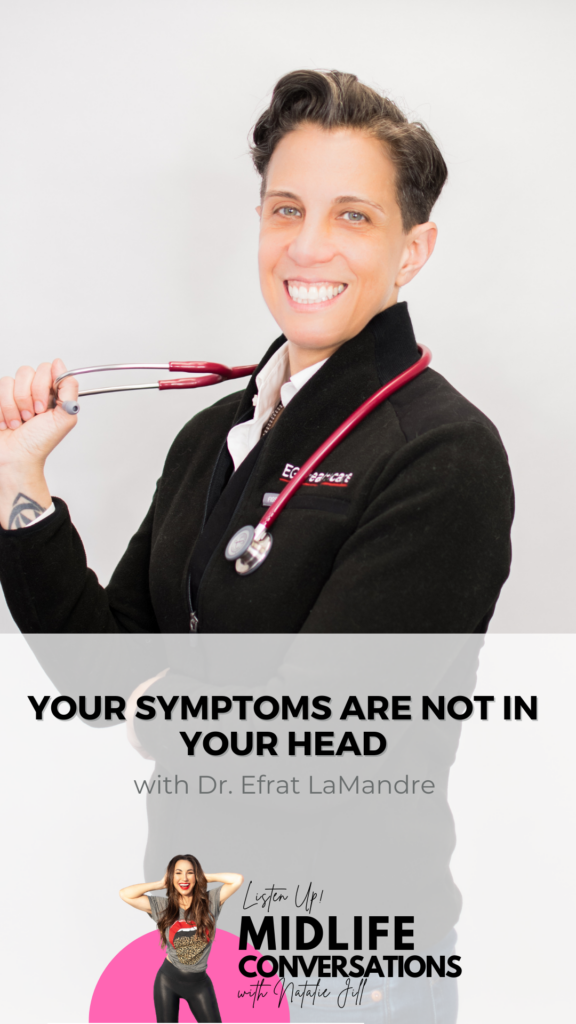18 Jul Your Symptoms are NOT in Your Head with Dr. Efrat LaMandre

I’ve been following Dr. E on Instagram and TikTok and I just LOVE the topics she covers for those in midlife. She’s got a really unique spin on this idea that things are in head — based on what we are TOLD. She got her start practicing traditionally in primary care (your traditional doctors office), where someone would come in and say something like “I don’t feel well”, she would run labs, and everything would check out fine so she would say “you’re fine, see you in a year!” because that is what she was taught. But then it hit home because someone she loved (her wife) got really sick. Both she and her wife pictured themselves as fit, healthy individuals who ate well…but then she learned that their nutrition was to blame for her wife’s autoimmunity. This changed EVERYTHING for her. I really wanted to bring her onto Midlife Conversations to share her point of view with us as someone who used to practice one thing she was taught, to transitioning into the more functional medicine approach.
What is the Difference Between Western and Functional Medicine?
Functional medicine takes western medicine to the next level — it’s not an either or. Western medicine is wonderful and necessary, but is designed to find a disease and then treat it. If you don’t fit the traditional parameters of a disease in western medicine, there are no other options for you. You hit a wall. For example, if you come in complaining of being exhausted, and your thyroid is fine and you don’t have anemia, western medicine will say you’re fine…because you don’t have pathology suggesting a disease. But you’re STILL exhausted. Functional medicine says, this means something…and we need to dig deeper, and has additional tools that help you get to the root cause of something BEFORE disease. It’s an extension of health.
💓 Show Sponsor: Nutrisense wants you to optimize your metabolism with data insights and personalized dietitian support. Visit nutrisense.io/nataliejill and use code NATALIEJILL to save $30 and get 1 month of FREE dietitian support. Be sure to let them know you’re a listener of Midlife Conversations with Natalie Jill when they ask you how you heard about them. [If you click on the link, I may receive a commission at no cost to you]
A LOT of Hormonal Symptoms Can Be Directly Tied to What You Eat – NOT always your Hormones
Shocker — hot flashes aren’t always caused by hormones! They can be caused by the food you’re eating. For example, you’re in midlife and you drank wine and ate pasta for dinner. You go to bed and get hot flashes and are SURE it’s hormones. But really…it’s because what you just consumed; you are now hypoglycemic and are sweating as a result. This is not to say that hormones are never to blame, but before you start hormones, be sure to dive down the rabbit hole of your nutrition BEFORE you start to make sure that your symptoms are actually all truly related to hormones. You can clean up your nutrition for 30-60 days or whatever, and if you’re STILL having symptoms, then maybe you actually do need hormones. All symptomatic patients don’t NEED hormones and all un-symptomatic patients don’t NOT need hormones…it requires a deeper dive. This same concept is very true when it comes to mold toxicity and being diagnosed with fibromyalgia (A LOT of those symptoms –brain fog, the random pains, the pots, etc.–are often identical to mold symptoms actually caused by mold!!)
What About Adrenal Fatigue?
You can test for adrenal fatigue through an all day saliva test. If you go to a doctor they will do a one point in time cortisol test and that’s it. What we WANT to see is a higher cortisol marker in the morning with it gradually tapering off into sleep. But we can have a lot of different variances in there depending on our adrenal performance or lack-there-of. How varied you are from the normal graph determines the level of your fatigue. When you’re in super adrenal fatigue (phase 3), you actually can cause MORE harm than good by trying too hard to muster up the energy to workout. In fact, if you’re in Phase 3, you should NOT be doing a lot of workouts. You simply don’t have a reserve of cortisol strong enough to help you bounce back from your workout depletion and you will end up even more drained than before.
This and SOOO MUCH MORE on optimal functional health on this episode!
About Dr. Efrat LaMandre
Efrat LaMandre is a Family Nurse Practitioner with a Ph.D. in Integrative Medicine. Efrat is a medical entrepreneur. When she sees an issue she fixes it and create a business around it. She started EG Healthcare to provide a different kind of primary care for the people in her community. The Knew Method resulted from seeing patients who needed an extra level of care. Hawk Scribes came from her desire to care for her patients without taking time away from them for charting. The consulting business developed from her passion to help others rise to their greatest potential utilizing what she has learned on her own journey.
In this episode, you will learn:
- Is it menopause that’s causing your symptoms or something else?
- Should you just accept your HRT treatments or ask more questions?
- Why saliva tests are best for adrenal fatigue
- Sometimes the diagnosis you’re given isn’t actually the problem
- How to ask the right questions to figure out the root cause of your symptoms.
